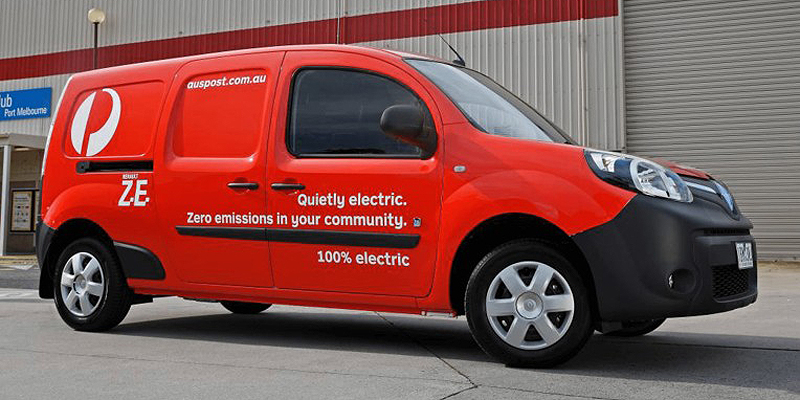The French brand has primarily targeted fleet buyers – water authorities and electricity companies, for example – with the Zoe, which is priced from $44,470 plus on-road costs, and Kangoo ZE (from $45,990) since their launch late last year.
However, Renault Australia managing director Andrew Moore told GoAuto that a positive response to the Zoe in particular had prompted the company to expand into retail purchasing using dealers who have reported strong enough demand to warrant expanding the business.

Generating spark: Encouraged by strong early interest in the cute zero-emissions Zoe light hatch, Renault Australia is now moving to retail sales from select dealers across various states.
“We started with a fleet-only model … and we are working through now creating a retail model where dealers will wholesale cars from us,” he said.
“You’ve got to be careful – you don’t want to go too far, too early, and damage the reputation by bringing in too many cars and having problems moving them. So we are just going to go step by step.”
VFACTS figures to the end of February show that Renault has sold 12 examples of the Zoe since last October, with one registration of the Kangoo ZE over that period.
Mr Moore said that for every five Zoe sales the company expected to shift about four Kangoo ZEs.
In overall market terms, 1124 EVs (including plug-in hybrid electric vehicles) were sold in Australia last year among the car companies subscribing to the official industry reporting service – covering 50 brands but not including Tesla Motors – with two-thirds of these non-private purchases (747) and the remainder to private buyers (377).
Still only representing 0.095 per cent of all new-vehicle sales, last year’s result at least placed EVs back around the 1100-unit mark – a level achieved with the introduction of Mitsubishi’s Outlander PHEV SUV in 2014 – after an unexpected downturn in 2016, when just 219 EVs were sold.
This year, 195 EV sales have been recorded after two months of trading, 50 private and 145 non-private.
Mr Moore said Zoe and Kangoo ZE would remain low-volume propositions for the company in the current environment as it looks to protect residual values and lay the groundwork at a retail level before all-new models – among eight pure-electric vehicles to be developed by 2022 – reach the market in a few years’ time.
“We are upgrading our network at the moment so we can deliver and service in each state,” he said.
“We started off just a Melbourne and Sydney network and that sort of slowed things up because, interestingly, there’s a lot of interest out of Adelaide, out of Tasmania, out of WA, out of Canberra.
“We’re not right yet – (in terms of dealer) infrastructure ready – but that’s one of our focuses of the next few years, is to set up the infrastructure but also set up a positive mindset around EV so that when the ‘right’ vehicles land – and I’m thinking three or four years for Renault – we’ll be the brand that’s really set to go from a network and infrastructure perspective.”
Mr Moore said momentum shift with EVs in Australia would come when car manufacturers start moving away from “out there” designs for eco cars that appeal primarily to early adopters – he referenced BMW’s i3 and i8 as examples – and instead include fully electric powertrains as part of volume-selling model lines.
“It’s going to be product-driven,” he said. “The day the ‘right’ car lands, people will buy it. At the moment, Zoe is closer to the right car because at least it looks cool for a light hatch – its challenge is that it’s expensive for a light hatch, so you have really got to want to pay the premium.”
The Renault chief sees the escalation of average Australian households fitting solar panels to their roof as a major step towards increased EV ownership, with those consumers having direct experience in harnessing energy from the sun and saving money by generating their own electricity.
“If you think about, those houses can power (recharge) their car when it’s parked,” Mr Moore said, adding that sales should really take off once a better balance is struck between vehicle body style, driving range (eliminating ‘range anxiety’) and a lower premium for an EV powertrain compared to internal combustion engines.
“The Zoe is now 400km (driving range) and we are getting retail interest on Zoe. That is a premium for electric at the moment, but when you get to the point where, say, it is an SUV and the premium is not so great and people are happy to pay a bit extra on those sorts of cars, I think we will see a big shift in Australia in EV uptake.”
Asked to explain how Renault was setting up a “positive mindset” around EVs, Mr Moore said the company was aiming to “set the expectations right” in the marketplace in areas such as vehicle supply, sales force and dealership facilities.
“At the moment, we don’t expect that everyone is going to want to buy EV and that every dealership will sell EV,” he said.
“(We will) keep it realistic – Zoe will have good residuals, so I’m not going to bring in thousands of Zoes when we’re just not going to sell them, I’m going to bring in what people want so residuals will retain well – and our dealer network will be contained to smaller experts on EV rather than every dealer having a charging space and so forth,” he said.
“We’ll have EV specialists where the customer walks in and gets a really good sales experience, gets a really good service experience.”
Mr Moore said that as sales volume grows, the company would add more specialist dealers from its network – currently 57 outlets nationwide – into the mix.
“It’s about sustainable, realistic growth,” he said.
“From my perspective, I think it’s an opportunity for us here in Australia – probably not short-term big volume but I think there’s going to come a time when the government starts putting incentives in place.
“Do I think they’re financial incentives? Maybe not. But I think Australian people would warm to incentives like … free parking in the city, or express lanes in unavoidable traffic.”
By Terry Martin














 Read More: Related articles
Read More: Related articles

